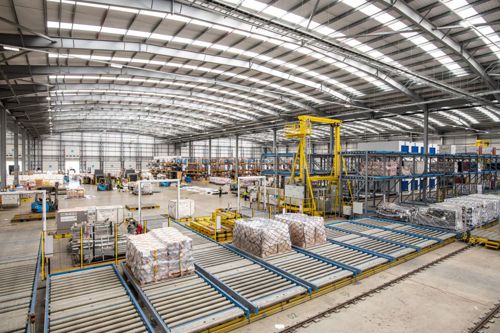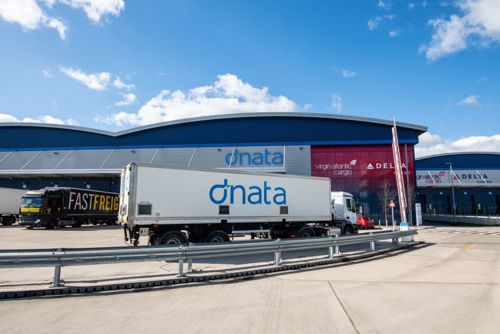
With a network of more than 120 airports and a presence in more than 20 countries, dnata’s vision did not change during the pandemic, being the most admired and trusted company is more important than size.
Speaking to journalists at dnata Cargo City East at Heathrow Airport on 17 March, Group CEO Steve Allen said dnata is a performance-driven company, which is hot on innovation, something that is founded in its roots in Dubai.
Its footprint has grown significantly in the last 10-15 years and dnata is in a strong position coming out of the pandemic but business remains challenging.
Allen said: “We’re going through a very unpredictable phase; everybody knows the volatility that’s in the market. We’re seeing an inconsistent recovery from the pandemic, it’s very difficult for us to plan and optimise our business when countries are opening and closing their borders and growth is happening at different rates all over the world.”
Many companies have built up considerable amounts of debt so Allen believes more companies will look at outsourcing and Allen wants them to turn to dnata.
The war in Ukraine could cause serious issues globally and though dnata does not have handling operations in either Ukraine or Russia, it is keeping an eye on the situation.
The labour market is another challenge; many people have left the industry so talent needs to be encouraged back.
He told the audience of journalists: “This is probably our biggest challenge right now, attracting people back into the aviation industry, making sure we can handle the requirements people have these days. People have changed the way in which they work, there is wage inflation, which is going to have an impact on our bottom line. This challenging labour market is probably the biggest thing that we need to tackle in the next 6-12 months as we grow back.”
The environment is increasingly important, and dnata has had a sustainability strategy for a long time but now it is being stepped up because the company realises that demands to make business sustainable will only grow stronger. Customers increasingly ask that the sustainability strategy is part of the contract.
Cargo has been the winner of airport operations due to strong demand to keep supply chains moving, combined with the well-publicised ocean freight issues.
“We’re very strong on the cargo side and that’s brought in much needed cash for our business,” commented Allen.
When the pandemic started, there were expected to be numerous business failures but the main players have remained solvent. Some smaller regional players have suffered and Allen says there are opportunities for investments. Many competitors have more instability on their balance sheets, according to Allen, and different drivers for their shareholders.
“One of the big advantages we have is that we have a very solid base, we’re in it for the long term. We have a shareholder with no intention of discontinuing or changing the way in which they invest in our business. Therefore, going forward we should be able to continue our growth trajectory and maintain who we are despite all the turbulence we are going through,” explained Allen.

Problems on the ground
Ground handling is a problem for carriers, admitted Allen, with flights getting cancelled because handlers do not have the staff to service flights. dnata wants to take that problem out of their hands.
Allen said: “Our role is make sure that we’re ready and able to handle carriers wherever we are in the world and that they can turn to us for support when they’re concentrating on things like getting crews retrained and building up their passenger profile.”
Innovation is vital going forward, particularly for cargo. Always considered the poor cousin, now everyone is interested in cargo and saying we need to digitise it, said Allen, to make it more seamless − topics which have been discussed for years.
Allen said it has become trendy to talk about cargo, and this is a huge opportunity to standardise and optimise operations.
OneCargo is dnata’s cargo management system for worldwide operations. It is being used in five countries but will be rolled out globally, providing a single system making things like training and data sharing easier.
Calogi, dnata’s trading platform in the UAE, lets freight forwarders pre-register all documents online so there are no processes in the warehouse as everything has already been cleared with customs.
Drones, a fun but practical tool said Allen, were trialled at Dallas/Fort Worth International Airport with great success so will be rolled out elsewhere.
They can do all the stock checking and advise how best to build pallets depending how things are being moved around the warehouse.
“Our objective is to triple our investment in technology in 2024. We really believe technology is the way forward and we need to get in the forefront of that. We’ve got lots in the pipeline but we need to up that investment to make the most of that opportunity,” said Allen.

Ambitious growth plans
Joining the session virtually was Stewart Angus, Regional CEO for Europe who, having avoided catching it for two years, had Covid.
In Europe, dnata is present at 12 airports in five countries and it handles 1.4 million tonnes of cargo annually. Growth is the plan, although Angus could not give further details. There will be announcements this year.
Growing sustainably is very important, and Angus gave a few examples, such as 40% of its GSE fleet being electric, a number which will only go up.
In Switzerland, dnata has just signed off a deal for five electric de-icing machines to service a new contract with easyJet in Geneva.
Taking the initiative, dnata is working with the airport operator at Amsterdam Airport Schiphol on a taxi-bot trial, controlling the pushback and taking the aircraft to the holding point on the runway without the need to turn any engines on.
Schiphol is a large airport and aircraft can be taxiing for miles so the fuel and emission savings are enormous.
Angus commented: “It sounds easy in principle but the trials are very complex because you have to have a way of getting the bots back to the gate to do the next aircraft.”
All new facilities are BREEAM accredited with measures as simple as designing the building to have plenty of natural light, not only reducing carbon requirements but also makes it a nicer place to work, improving productivity.
In recent years, dnata has invested heavily in infrastructure, opening 7 new facilities in the UK alone since 2014, of which 6 were new builds. It opened up in Brussels in 2018, expanding in 2021 and started operations in Milan in 2020 through a sub-contractor arrangement.
Pharma facilities have been expanded and in the UK, dnata has the largest independent pharma capacity of any cargo handler.
Investments have not stopped; work has just started on a new facility at dnata Cargo City Amsterdam, a 61,000-squaremetre facility which will be able to handle 850,000 tonnes a year when it is operational in 2024.
At over €200m, it is dnata’s largest single investment in cargo facilities. Angus knows of no other investment of this size and if anyone knows of a bigger one, please let him know.
“We took this decision in the dark days of Covid, which is a sign that I’m working for the right company. Even in the darkest days we were prepared to make that decision on this massive investment,” he said.
Angus told the team in Amsterdam that he wants what they have in the UK but to take it to the next level. It will have two separate Automated Storage and Retrieval Systems (ASRS), Automated Guided Vehicles (AGV), smart gates and it will be BREEAM certified.
“When we were in Amsterdam for the ground-breaking ceremony, I was taken aback when I saw it myself. I’ve seen the plans but when you see it on the ground, it is the size of eleven football pitches I’m told and when I saw it I thought, yes, we could host the World Cup there, it’s very big,” he joked.
Expansion in the UK
The UK is dnata’s largest European market and further investments will allow it to continue growing. In 2012, dnata handled 294,000 tonnes of cargo and this had risen to 706,000 tonnes for 2019/20.
At Heathrow alone, dnata has eight cargo facilities. With these volumes, dnata needed a much larger footprint in the UK, said Chief Commercial Officer for dnata UK, Mohammed Akhlaq.
With strong demand, it was clear that only operating at Heathrow would not suffice, dnata needed to connect the whole of the UK. With regional connections, dnata has 13 cargo facilities connected to Heathrow Airport with trucking services.
Imports arriving at Heathrow can go to the regions on a daily basis and exports go back to fill capacity at Heathrow.
Being able to offer links to the regional airports was important but so was upgrading Heathrow Airport as staying at the infamous Horseshoe, as it is nicknamed, with its poor design and congestion, was not acceptable.
“For us, it was clear we couldn’t live in that congested world with traffic flow problems and parking issues and huge delays at peak periods, which exists to this day. It’s a pure truck-dock operation, which restricts you in yard space for loading and offloading vehicles,” said Akhlaq.
Calling it Better by Design, dnata wanted to create individual facilities, bespoke to carriers. One large facility servicing 30 airlines was not a workable model at Heathrow, said Akhlaq; instead, separate facilities means carriers can market them under their own brand while being serviced by dnata.
Akhlaq said: “If we market them the right way and provide the right infrastructure, bespoke for their products and services, that’s a win-win, not just for them but for us too. If they can be marketed and sold in the right way, that’s more kilos for us. More kilos for us means more revenue.”
Looking away from London, Manchester is the airport of the north. Akhlaq said: “We, along with Manchester Airports Group, went into an arrangement where we built a new facility which we opened last year. It’s a brilliant addition and it mirrors what we’re doing in Heathrow and gives us that consistency across the network.”

dnata City East grows
dnata was giving the presentation at dnata City East, where it handles Delta Cargo and Virgin Atlantic Cargo. Phase One, where it was hosting the event, opened in September 2019 with 180,000 square feet of warehouse space and 34,000 square feet of office space. It can handle 250,000 tonnes of cargo a year and is being used for both imports and exports until Phase Two is ready. By the time you read this, Phase Two will be operational and handling imports.
It has 92,000 square feet of warehouse space and 19,771 square feet of office space, with a handling capacity of 125,000 tonnes a year. Other features include 12 landside doors and 12 airside doors including 6 truck docks.
Over the past 10 years, dnata has grown substantially with 6 new regional cargo facilities, 6 new builds at Heathrow and Manchester airports, 3 facilities have been refurbished at Heathrow, and another 5 have been refurbished at regional airports.
Highlights were opening dnata City at Heathrow in February 2014; refurbishing the old Post Office building at Heathrow for Cathay Pacific, which might as well have been a new-build by the time dnata was finished in May 2016, said Akhlaq; and opening dnata City North in Manchester in January 2021.
Alex Doisneau, Managing Director of dnata UK described April 2014 as a “big bang” when facilities were opened at London Gatwick, Birmingham, East Midlands, Manchester, Glasgow and Newcastle airports. Taking on the Emirates SkyCargo contract was a major reason for opening all of these facilities and setting up a regional trucking network.
dnata opened a second facility in Manchester in 2016 and at the same time, Gatwick was growing strongly but the pandemic has, in Doisneau’s words, “decimated” cargo at Gatwick. In 2014, dnata was handling about 20,000 tonnes a year at Gatwick, this figure went up to over 80,000 tonnes in 2017 but now it is less than 10,000 tonnes.
“During the pandemic, the regional airports lost a lot of traffic because everything went back to the hub but investing in Manchester and Gatwick are really important to us because it will come back, it will grow again,” said Doisneau.






